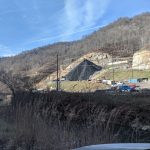
With funding from the EPA, Appalachian Voices purchased dozens of PurpleAir PM sensors, and distributed these to individuals and grassroots organizations in Virginia, West Virginia, Kentucky, Tennessee and Pennsylvania.

With funding from the EPA, Appalachian Voices purchased dozens of PurpleAir PM sensors, and distributed these to individuals and grassroots organizations in Virginia, West Virginia, Kentucky, Tennessee and Pennsylvania.

Today, the U.S. Environmental Protection Agency strengthened air pollution rules for particulate matter pollution, as it released its final National Ambient Air Quality Standards.

Today, the White House Environmental Justice Advisory Council voted unanimously to submit a letter to the Biden administration highlighting the disproportionate impact of fine particulate matter and ozone pollution on low-income communities and communities of color.

PM 2.5 is a lethal combination of metals, organic matter, acids and other substances so tiny that they can be inhaled and delivered directly into the bloodstream. These airborne pollutants are emitted by tailpipes, power plants and numerous other industries. In our region, coal mine dust is an additional source of this pollutant.

The proposal is a step in the right direction, but it doesn’t go nearly far enough. In Appalachia, our people are breathing fugitive mine dust and toxic emissions from numerous industries. Time and again, state regulatory practices have fallen short in curbing the impacts of these industries. Fugitive coal mine dust in particular has not been regulated in any meaningful way. EPA can and should do more to protect our health.

After a decade of focusing on water pollution from coal mining, Appalachian Voices’ coal impacts team is embarking on an ambitious project to monitor air pollution in communities impacted by coal mining and other fossil fuel infrastructure, and in other communities where air quality is an environmental justice concern.

Appalachian Voices has received $118,000 from the U.S. Environmental Protection Agency to fund the Upper South and Appalachia Citizen Air Monitoring Project.

Frustrated with constant coal dust, residents of Eunice, West Virginia, asked the state to install an air quality monitoring device in their community. The request was denied.